|
|
|
Sort Order |
|
|
|
Items / Page
|
|
|
|
|
|
|
| Srl | Item |
| 1 |
ID:
157829
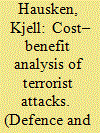

|
|
|
|
|
| Summary/Abstract |
A cost–benefit analysis of terrorist attacks is developed and placed within a systematic theoretical structure. For the target or object of the attack, we consider the lost value of human lives, lost economic value, and lost influence value, counted as benefits for the terrorist. The corresponding losses for the terrorist are counted as costs. The terrorist attacks if benefits outweigh costs. Bounded rationality is enabled where the three kinds of benefits and costs can be weighted differently. We account for two ex ante probabilities of successful planning and attack, and enable the terrorist to assign different weights to its multiple stakeholders. We introduce multiple time periods, time discounting, attitudes towards risk, and subcategories for the benefits and costs. The cost–benefit analysis is illustrated with the 11 September 2001 attack, and 53 incidents in the Global Terrorism Database yielding both positive and negative expected utilities. The paper is intended as a tool for scientists and policy-makers, as a way of thinking about costs and benefits of terrorist attacks.
|
|
|
|
|
|
|
|
|
|
|
|
|
|
|
|
| 2 |
ID:
083229
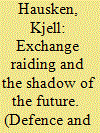

|
|
|
|
|
| Publication |
2008.
|
| Summary/Abstract |
Abstract A two-period exchange model is developed where production decisions in the first period determine the amount of resources available in the second period. Each agent allocates resources to defend its production and attack the production of the other agent. Production, conflict and exchange occur simultaneously in a dynamic model. This extends earlier exchange models, which are static and preclude defense and appropriation. The agents jointly determine price through their export decisions. Upon introducing exchange endogenously, raiding in the first relative to the second period decreases with growth, appropriation cost, and when the future becomes more important, and increases with defense cost, production cost, and usability of appropriation. Increasing the usability of appropriation and defense cost causes a transition from pure exchange via joint exchange and raiding to pure raiding. This implies that agents gradually substitute from defense to appropriation, they exchange less, and utility decreases. Utility isoquants in a usability of appropriation versus discount factor diagram are concavely increasing for joint exchange and raiding, and can be convexly decreasing for pure raiding. Cobb-Douglas utilities are assumed. The results are confirmed with CES utilities
|
|
|
|
|
|
|
|
|
|
|
|
|
|
|
|
| 3 |
ID:
075801
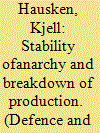

|
|
|
|
|
| Publication |
2006.
|
| Summary/Abstract |
In Hirshleifer's (1995) model for unitary actors, combined fighting/production abruptly breaks down when inter?group decisiveness of fighting is above a certain value (above one) or income requirements are not met. Accounting for the collective action problem, this article gives the opposite result that fighting/production is stable also for large decisiveness parameters (above one) and strict income requirements for each agent. The stable fighting/production equilibrium gets gradually easier to perturb off balance for high inter?group decisiveness, high costs of fighting, different fighting efficiencies, and equal group sizes. The equilibrium number of groups that can be sustained decreases in the inter?group decisiveness and increases in the cost of fighting.
|
|
|
|
|
|
|
|
|
|
|
|
|
|
|
|
| 4 |
ID:
116236
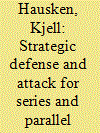

|
|
|
|
|
| Publication |
2012.
|
| Summary/Abstract |
Kovenock and Roberson's (2012a, b) replication of Hausken's (2008a) equations and parameter restrictions do not enhance our insight into the defense and attack of reliability systems. This reply intends to fill the remaining understanding gaps.
|
|
|
|
|
|
|
|
|
|
|
|
|
|
|
|
| 5 |
ID:
116238
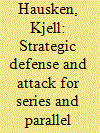

|
|
|
|
|
| Publication |
2012.
|
| Summary/Abstract |
Kovenock and Roberson's [2011] comment provides initial work which has the potential, when suitably extended, to advance the research frontier. Kovenock and Roberson's paper consists of three sections. The first section is an interesting introduction. The second section, titled 'Model and Main Result,' provides no contribution beyond Hausken [2008a]. It consists of Equations (1)-(10) which are equivalent to equations developed by Hausken, and Equation (11) which is equivalent to the utility requirements u??0 and U??0 provided after Equation (17) in Hausken. The third section provides interesting ideas about mixed-strategy equilibria that can be extended in future research.
|
|
|
|
|
|
|
|
|
|
|
|
|
|
|
|
| 6 |
ID:
121363
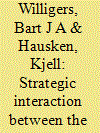

|
|
|
|
|
| Publication |
2013.
|
| Summary/Abstract |
The 2011 UK tax rise on hydrocarbon exploitation activities obviously increases short term tax revenues however the longer term effects are less clear. The strategic interaction between the UK government, a producer and a shipper has been analyzed in a game theoretical model. A complex interaction between players is expected given (1) dwindling resources and large decommissioning liabilities and (2) the fact that much of the hydrocarbons produced in the North Sea are exported through an infrastructure with shared ownership.
The 2011 UK tax adjustment will most likely result in value destruction for the government, producers and shippers. Our analysis suggests that governments are unlikely to ultimately benefit from reducing their decommission liabilities at the expense of International Oil Companies. In countries with unstable tax regimes, such as the UK, International Oil Companies will adopt their strategies in anticipation of future tax changes. Their adopted strategy is a function of decommissioning liabilities and remaining reserves as well as whether they are producers, shippers or producers and shippers. The ultimate payoff of a government is a function of the remaining reserves and total decommissioning liabilities, but also depends on the distribution of these value metrics between producers and shippers.
|
|
|
|
|
|
|
|
|
|
|
|
|
|
|
|
|
|
|
|
|